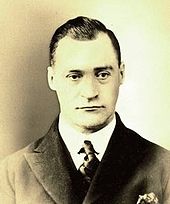Karl Joseph Wilhelm Juchheim
Karl Joseph Wilhelm Juchheim (born December 25, 1886 in Kaub ; † August 14, 1945 in Nada-ku , Kobe ) was a German confectioner who brought the Baumkuchen to Japan . The Juchheim company that emerged from his shop is still producing in Japan today.
Life
Kiautschou
Karl Juchheim, who comes from Kaub am Rhein, came to the German colony of Kiautschou in 1908 at the age of 22 and worked there in a coffee house. In 1909 he set up his own pastry shop , where he sold, among other things, Baumkuchen . After spending five years in China, he returned to Germany for a short time to look for a wife. Through his uncle, he met the 22-year-old Elise in the spring of 1914 and soon became engaged to her. Juchheim had only recently returned from the Far East, but he and Elise moved back to Kiautschou during the engagement period. They married there on July 28, 1914. Karl Juchheim ran a pastry shop there with his wife.
Prisoner of war
When the First World War broke out shortly afterwards , the British and Japanese sieges of Tsingtau began . After the siege came to a victorious end with the surrender of the German defenders for the Japanese, Karl Juchheim and his wife Elise were deported to Osaka as prisoners of war . While he was interned in a camp , his wife Elise initially lived alone with their son Karl-Franz Juchheim, who was born on November 4, 1915, in Qingdao, which was occupied by Japan . She sent a photo of her son and herself to a mutual friend in Germany, which was probably intended for Karl and was emblematic of the separated, adventurous life they led at the time.
Like other prisoners, Karl Juchheim was transferred to Hiroshima in 1917. There was an exhibition of German products in the Hiroshima exhibition hall (today's atomic bomb dome ). For this he had baked the first tree cake in Japan.
The First World War ended on November 11, 1918 with the Armistice of Compiègne . Most of the prisoners were released in December 1919 and January 1920. The majority returned to Germany, but some like Karl Juchheim and his wife, August Lohmeiyer or Hermann Bohner settled in Japan and East Asia. The reason for the Juchheims to stay in Japan was that a cholera epidemic was raging in Qingdao .
post war period
After the war, Karl Juchheim initially sold his Baumkuchen in the then famous Café Europe in Tokyo, where he worked with his war comrade Hermann Wolschke. Later Karl and Elise Juchheim opened their own confectionery shop in Yokohama in 1921/22 with the name E. Juchheim , named after his wife. As master confectioner, Karl Juchheim was responsible for making the cake and pastries, while his wife Elise ran the shop. The business was completely destroyed by the Great Kanto quake on September 1, 1923. The Juchheim couple then moved to Kobe , borrowed a large amount of money and opened a new shop there, the Juchheim’s confectionery company . The store became a huge success and grew within a short period of time.
death
In 1944, the lease had to be terminated because of the Pacific War , as production was no longer possible. The Juchheim family then moved to the Rokkosan Hotel. Karl Juchheim died there on August 14, 1945, one day before Japan's surrender . His body was cremated for cost reasons . His son Karl-Franz was drafted into the Wehrmacht in 1942 and pronounced dead after the end of the war. His death was subsequently dated May 6, 1945 in Vienna. After the war Elise was expropriated and deported to Germany by the Supreme Commander for the Allied Powers . The company was reorganized as Juchheim Co., Ltd in 1950 . Elise Juchheim was able to return to Japan in 1953. She lived there until 1971. Both Karl and Elise Juchheim are buried today in the Ashiya cemetery.
company
The Juchheim Group , which emerged from Juchheim's shop, is still based in Kobe today . Their characteristic design has existed in this tradition for around 40 years. The company prides itself on the fact that master pastry chefs still manufacture their products according to the original German recipe. Juchheim has numerous branches and subsidiaries in Japan , where it is particularly known for tree cakes , Frankfurter Kranz , tea cakes and apple cakes . The group of companies has approximately 564 employees and annual sales of 27.4 billion yen .
Brands
- JUCHHEIM (ユ ー ハ イ ム)
- Master JUCHHEIM (マ イ ス タ ー ユ ー ハ イ ム)
- JUCHHEIM THE MASTERS (ユ ー ハ イ ム ・ デ ィ ー ・ マ イ ス タ ー)
- KARL JUCHHEIM (カ ー ル ユ ー ハ イ ム)
- BOBBY JUCHHEIM (ボ ビ ー ユ ー ハ イ ム)
- ROSENHEIM (ロ ー ゼ ン ハ イ ム)
- Peltier (ペ ル テ ィ エ)
Web links
Individual evidence
| personal data | |
|---|---|
| SURNAME | Juchheim, Karl Joseph Wilhelm |
| BRIEF DESCRIPTION | German confectioner |
| DATE OF BIRTH | December 25, 1886 |
| PLACE OF BIRTH | Chew |
| DATE OF DEATH | August 14, 1945 |
| Place of death | Nada-ku , Kobe (Japan) |



